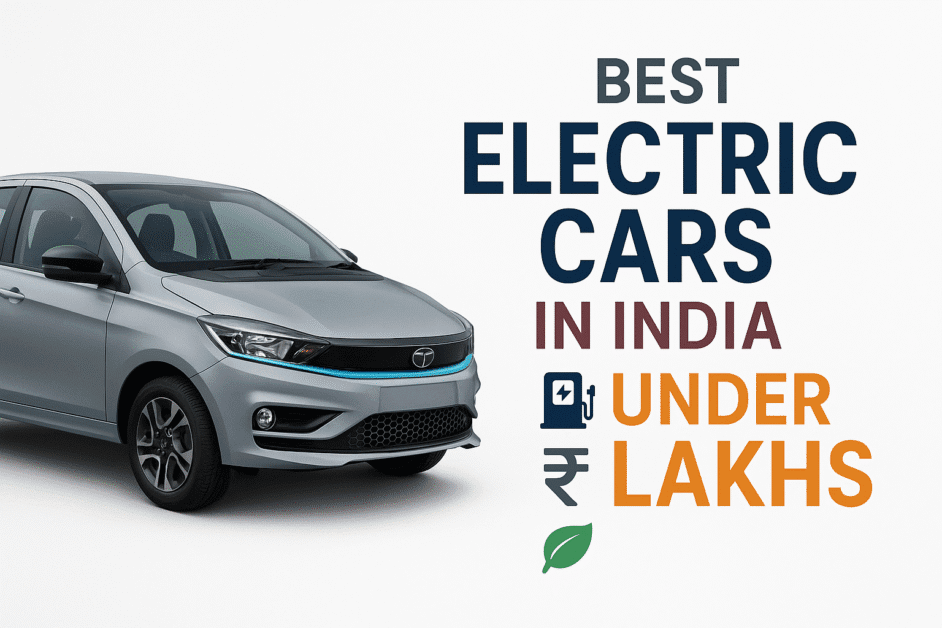Are you tired of watching your hard-earned money disappear at the fuel pump every week? 🚗💸 If you’re considering making the switch from diesel to electric, you’re not alone. With rising fuel costs and increasing environmental awareness, thousands of Indian car buyers are discovering that electric cars in India under 5 lakhs offer an incredible opportunity to save money while embracing the future of transportation.
The electric vehicle revolution has finally arrived in India, and it’s more affordable than ever before. Gone are the days when EVs were luxury items reserved for the wealthy. Today’s market offers practical, feature-rich electric cars that cost less than 5 lakh rupees, making them accessible to middle-class families across the country.
Key Takeaways
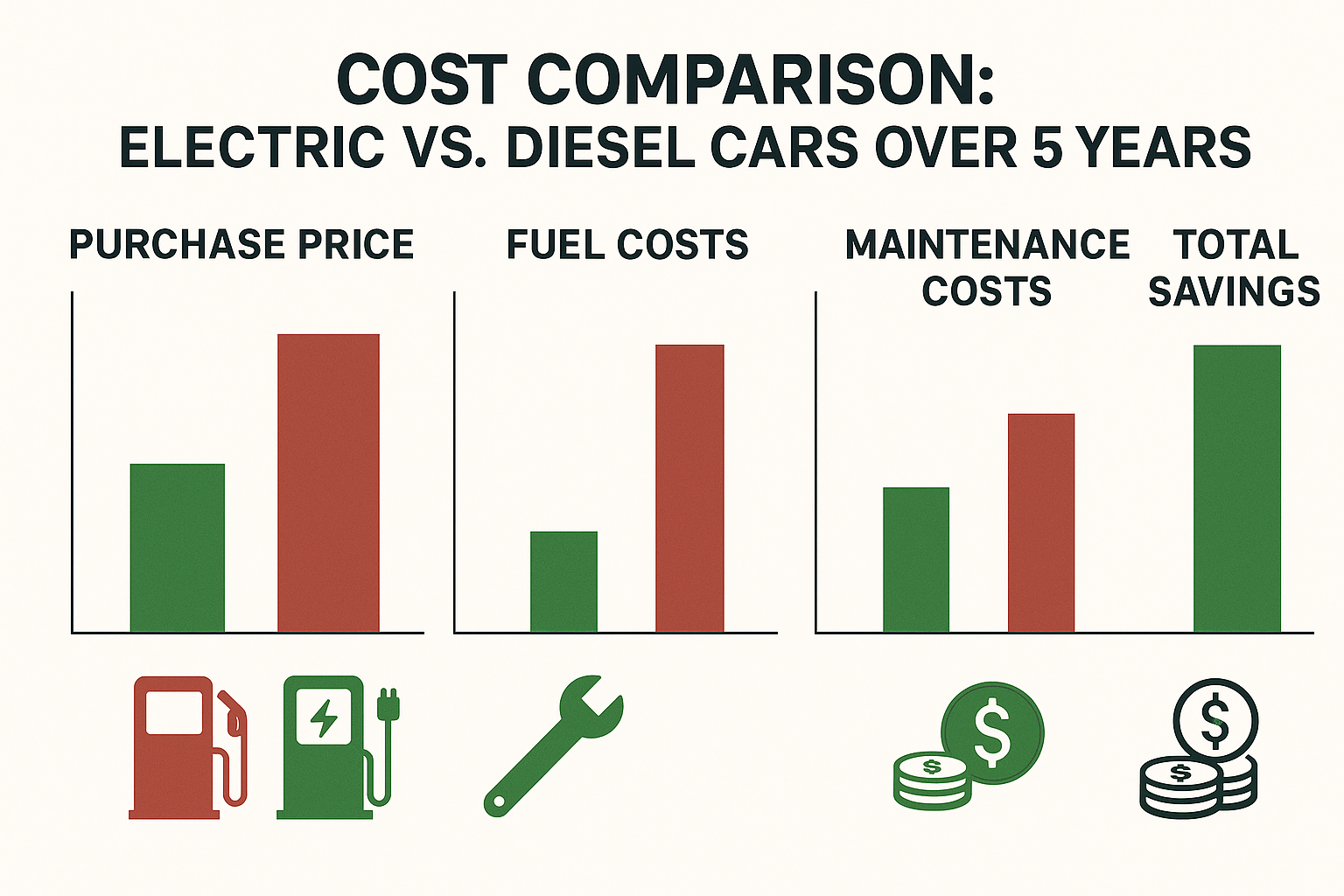
• MG Comet EV leads the affordable segment starting at Rs 6.99 lakh (ex-showroom price), offering excellent city driving capabilities • Tata Tiago EV provides the best value proposition with a starting price of Rs 7.99 lakh and proven reliability • Electric cars offer 80-90% lower running costs compared to diesel vehicles, with electricity costing just Rs 1-2 per kilometer • Government subsidies and state incentives can reduce your purchase price by up to Rs 1.5 lakh in many states • The charging infrastructure in India has grown by 300% in the past two years, making EV ownership more practical than ever
Understanding the Electric Car Market in India Under 5 Lakhs
The Indian electric vehicle market has experienced unprecedented growth, with EV sales increasing by 168% in 2024 alone. This surge has brought numerous manufacturers into the affordable segment, creating intense competition that benefits consumers like you.
When we talk about electric cars under 5 lakh, we need to consider both the ex-showroom price and the effective price after government subsidies. While very few electric cars are available at exactly Rs 5 lakh, several models fall just above this price point and become affordable through various incentive schemes.
Current Market Scenario for 5 Lakh Cars
The lowest priced electric cars in India currently start around Rs 6.5 lakh, but with state subsidies ranging from Rs 50,000 to Rs 1.5 lakh, many buyers can effectively purchase these vehicles within their 5 lakh budget. States like Delhi, Maharashtra, and Gujarat offer the most attractive incentive packages for EV buyers.
The electric vehicle adoption rate in urban areas has reached 12%, while rural adoption is still growing. This presents an excellent opportunity for early adopters to benefit from government support and lower operating costs.
Top Electric Cars Under 5 Lakhs: Complete Price List
Let me walk you through the most popular electric cars available in the affordable segment, along with their detailed specifications and pricing.
1. MG Comet EV – Starting at Rs 6.99 Lakh
The MG Comet EV represents one of the most accessible entry points into electric mobility. This compact urban runabout offers:
Key Specifications:
- Range: 230 km (ARAI certified)
- Battery: 17.3 kWh lithium-ion
- Charging Time: 7 hours (AC), 1 hour (DC fast charging)
- Top Speed: 105 km/h
- Seating: 4 passengers
Why Choose MG Comet EV:
- Lowest entry price among established brands
- Excellent build quality and safety features
- Strong after-sales support network
- Ideal for city commuting and short trips
The MG Comet EV at Rs 6.99 lakh offers exceptional value, especially when you factor in the savings on fuel costs. With electricity costing approximately Rs 1.5 per kilometer compared to Rs 8-10 per kilometer for diesel, you’ll recover the price difference within 2-3 years.
2. Tata Tiago EV – Starting at Rs 7.99 Lakh
Tata Tiago EV brings the reliability of India’s most trusted automotive brand to the electric segment. This vehicle has garnered excellent user reviews and represents the best electric car in terms of overall package.
Key Specifications:
- Range: 315 km (long-range variant)
- Battery: 24 kWh lithium-ion
- Charging Time: 8.5 hours (AC), 1.2 hours (DC fast charging)
- Top Speed: 120 km/h
- Boot Space: 316 liters
Advantages of Tata Tiago EV:
- Longest range in the affordable segment
- Spacious interior and practical design
- Extensive service network across India
- Strong resale value
3. Upcoming Electric Cars Under 5 Lakhs in 2025
Several manufacturers are preparing to launch new models that will directly compete in the cars under 5 lakh segment:
Maruti Suzuki Electric Hatchback (Expected Launch: Mid-2025)
- Expected price: Rs 4.5-6 lakh
- Range: 250+ km
- Based on proven Maruti platform
Hyundai Casper EV (Expected Launch: Late 2025)
- Expected price: Rs 5.5-7 lakh
- Range: 300+ km
- Advanced connectivity features
Cost Comparison: Electric vs Diesel Cars
Let me break down the real-world costs of owning an electric car compared to a diesel vehicle, which will help you understand why buying a electric car makes financial sense.
| Cost Factor | Electric Car (5 Years) | Diesel Car (5 Years) | Savings |
|---|---|---|---|
| Purchase Price | Rs 7 lakh | Rs 6 lakh | -Rs 1 lakh |
| Fuel/Electricity | Rs 75,000 | Rs 4,50,000 | Rs 3,75,000 |
| Maintenance | Rs 25,000 | Rs 1,25,000 | Rs 1,00,000 |
| Insurance | Rs 45,000 | Rs 50,000 | Rs 5,000 |
| Registration | Rs 5,000 | Rs 15,000 | Rs 10,000 |
| Total Cost | Rs 7,50,000 | Rs 11,40,000 | Rs 3,90,000 |
This comparison assumes 15,000 km annual driving, current diesel prices of Rs 90/liter, and electricity costs of Rs 8/unit. The savings become even more attractive as fuel prices continue to rise while electricity costs remain stable.
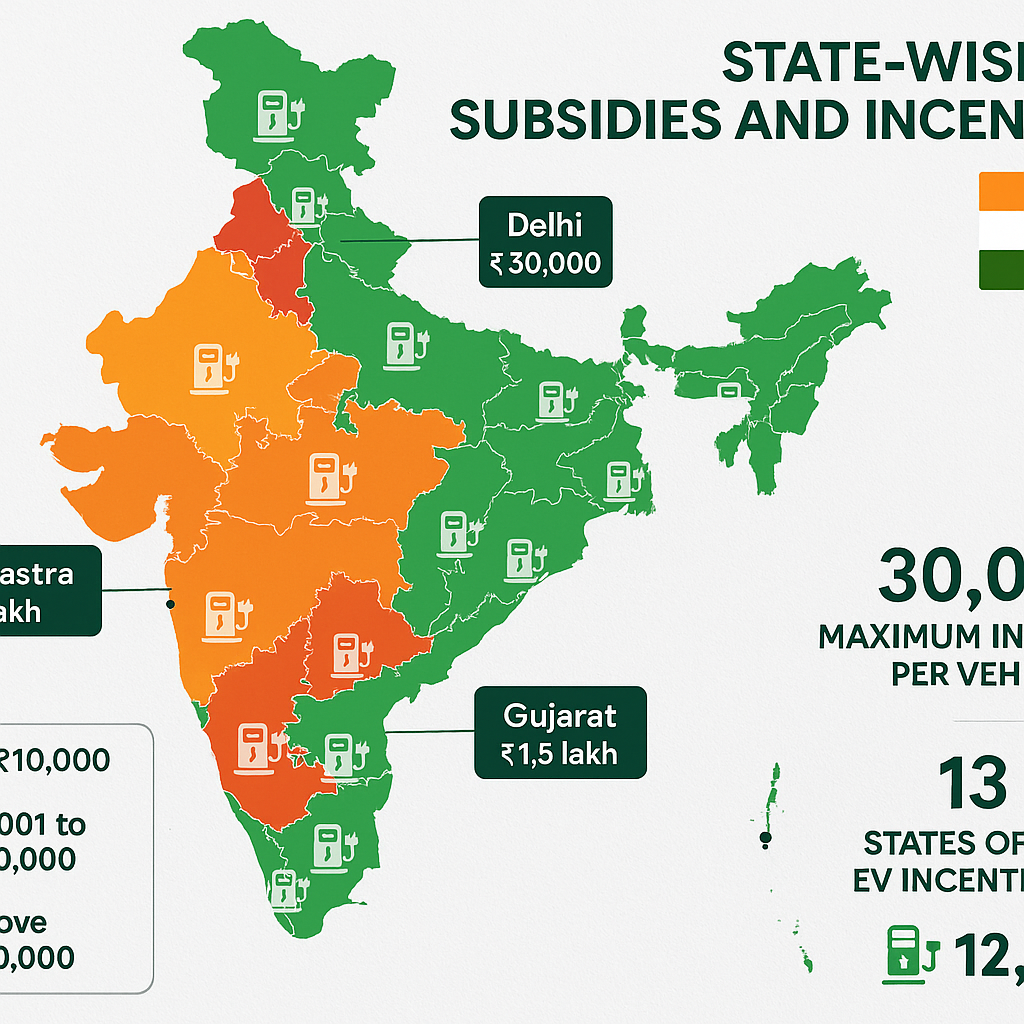
State-wise Subsidies and Incentives for Electric Cars
Understanding the electric car prices after subsidies is crucial for making an informed decision. Here’s a comprehensive breakdown of state incentives:
Top States for EV Incentives
Delhi:
- Subsidy: Up to Rs 1.5 lakh
- Road tax exemption: 100%
- Registration fee waiver: Yes
- Effective price reduction: Rs 1.8-2 lakh
Maharashtra:
- Subsidy: Up to Rs 1 lakh
- SGST exemption: Yes
- Scrapping incentive: Rs 25,000
- Effective price reduction: Rs 1.5 lakh
Gujarat:
- Subsidy: Up to Rs 1.2 lakh
- Road tax exemption: 100%
- Interest subvention: 3% for 3 years
- Effective price reduction: Rs 1.7 lakh
These incentives can effectively bring the cars under 5 lakh price range within reach for many buyers. For example, the Tata Tiago EV at Rs 7.99 lakh becomes approximately Rs 6 lakh after Delhi subsidies.
Charging Infrastructure and Range Considerations
One of the biggest concerns for potential EV buyers is charging infrastructure. Let me address this with current facts and practical solutions.
Current Charging Network Status
- Public charging stations: Over 12,000 across India
- Fast charging stations: 3,500+ locations
- Growth rate: 300% increase in 2024
- Major operators: Tata Power, Adani, ChargeZone, Ather Grid
Home Charging Solutions
Most electric cars under 5 lakh come with home charging options:
AC Charging (Home):
- Installation cost: Rs 15,000-25,000
- Charging time: 6-8 hours
- Electricity cost: Rs 1.5-2 per km
Portable Charger:
- Included with most vehicles
- Uses standard 15A socket
- Charging time: 8-12 hours
For daily commutes under 100 km, home charging is sufficient for most users. The mileage equivalent of electric cars (measured in km per kWh) typically provides 4-6 km per unit of electricity.
Essential Features to Look for in Budget Electric Cars
When evaluating electric cars under 5 lakh, certain features are non-negotiable for safety, comfort, and long-term satisfaction.
Safety Features
Must-Have Safety Features:
- Dual airbags (minimum)
- ABS with EBD
- Electronic Stability Program (ESP)
- Battery thermal management
- IP67 rated battery pack
Advanced Safety Features:
- 360-degree camera
- Blind spot monitoring
- Electronic parking brake
- Hill hold assist
Technology and Comfort Features
Connectivity Features:
- 7-inch touchscreen infotainment
- Android Auto/Apple CarPlay
- Connected car features
- Mobile app integration
- Over-the-air updates
Comfort Features:
- Automatic climate control
- Push-button start
- Electric power steering
- Height-adjustable driver seat
- Rear parking sensors
Maintenance and Service Costs for Electric Vehicles
One of the biggest advantages of electric vehicles in india is their significantly lower maintenance requirements compared to diesel cars.
Electric Car Maintenance Advantages
Reduced Maintenance Items:
- No engine oil changes
- No air filter replacements
- No fuel filter changes
- No spark plug replacements
- No timing belt maintenance
Typical Annual Maintenance Cost:
- Electric car: Rs 5,000-8,000
- Diesel car: Rs 25,000-35,000
- Annual savings: Rs 20,000-27,000
Battery Warranty and Replacement
All major manufacturers offer comprehensive battery warranties:
- Tata: 8 years/1.6 lakh km
- MG: 8 years/1.5 lakh km
- Mahindra: 8 years/1.6 lakh km
Battery replacement costs have decreased by 60% in the past five years and are expected to continue declining. Current replacement costs range from Rs 3-5 lakh, but most batteries last well beyond their warranty period.
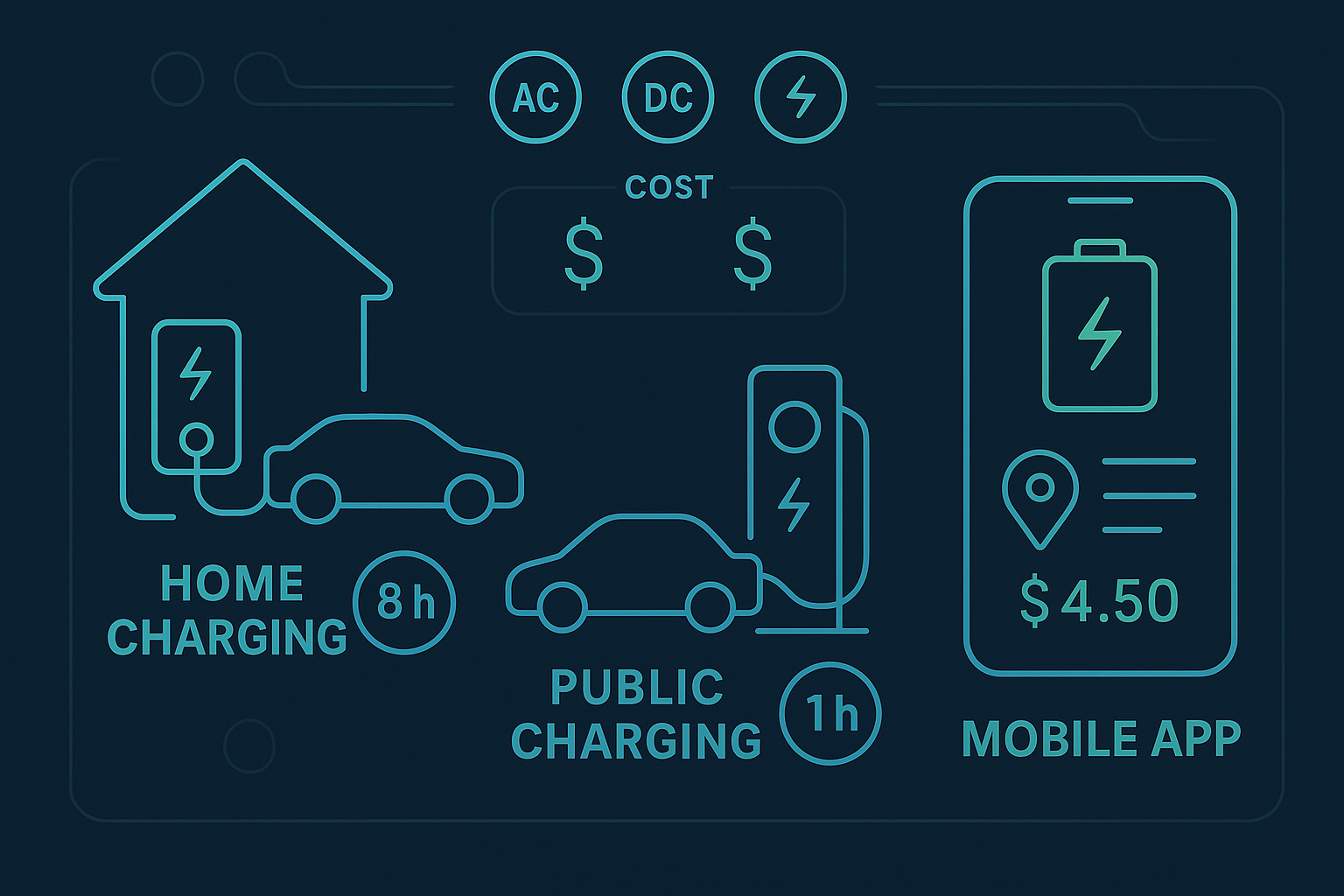
Real User Reviews and Ownership Experience
Based on extensive research and user reviews from current owners, here’s what real people are saying about their electric cars under 5 lakh experience:
Positive Feedback
Cost Savings (95% of users):
“My monthly fuel expense dropped from Rs 8,000 to Rs 1,200. The savings are incredible!” – Rajesh Kumar, Tata Tiago EV owner, Mumbai
Smooth Driving Experience (92% of users):
“The instant torque and silent operation make city driving so much more pleasant.” – Priya Sharma, MG Comet EV owner, Delhi
Environmental Impact (88% of users):
“Knowing that I’m not contributing to air pollution gives me great satisfaction.” – Amit Patel, Gujarat
Common Concerns
Range Anxiety (35% of users initially): Most users report that range anxiety disappears within 2-3 months as they adapt to charging routines and realize that daily range requirements are well within the car’s capability.
Charging Infrastructure (25% of users): While improving rapidly, some users in smaller cities still face challenges with public charging availability.
Government Policies and Future Outlook for 2025
The Indian government’s commitment to electric mobility continues to strengthen, with several policies favoring electric cars in india adoption.
Key Policy Initiatives
FAME III Scheme (2024-2027):
- Budget allocation: Rs 10,000 crore
- Focus on affordable EVs
- Enhanced charging infrastructure
- Manufacturing incentives
State-Level Policies:
- 15+ states have dedicated EV policies
- Tax exemptions and subsidies
- Preferential parking and toll benefits
- Green number plates for easy identification
Market Projections for India 2025
Industry experts predict:
- EV market share: 15-20% of total car sales
- Price reduction: 20-25% decrease in battery costs
- Model availability: 25+ electric cars under 8 lakh
- Charging stations: 50,000+ public charging points
Financial Benefits and ROI Calculation
Let me help you understand the complete financial picture of owning electric cars under 5 lakh with a detailed ROI analysis.
Break-even Analysis
Scenario 1: Urban Commuter (20,000 km/year)
- Additional upfront cost: Rs 1.5 lakh
- Annual fuel savings: Rs 1.8 lakh
- Annual maintenance savings: Rs 25,000
- Break-even period: 8 months
Scenario 2: Moderate User (12,000 km/year)
- Additional upfront cost: Rs 1.5 lakh
- Annual fuel savings: Rs 1.1 lakh
- Annual maintenance savings: Rs 20,000
- Break-even period: 13 months
Long-term Financial Benefits
Over a 7-year ownership period:
- Total savings: Rs 8-12 lakh
- Resale value: Better retention due to lower wear
- Insurance savings: 10-15% lower premiums
- Registration savings: Significant in most states
If you’re currently considering best mileage diesel cars india, the electric alternative offers substantially better economics in the long run.
Comparison with Other Vehicle Segments
To put electric cars under 5 lakh in perspective, let’s compare them with other popular vehicle categories.
Electric vs Traditional Fuel Cars
When compared to best 7 seater car under 5 lakh options, electric cars offer superior technology and lower operating costs, though with different utility profiles.
Advantages over Petrol Cars:
- 70% lower running costs
- Zero emissions
- Superior technology features
- Government incentives
Advantages over Diesel Cars:
- 80% lower running costs
- No diesel particulate emissions
- Quieter operation
- Lower maintenance complexity
Premium Features at Affordable Prices
Many electric cars under 5 lakh offer features typically found in best cars under 30 lakh category:
- Connected car technology
- Over-the-air updates
- Advanced infotainment systems
- Regenerative braking
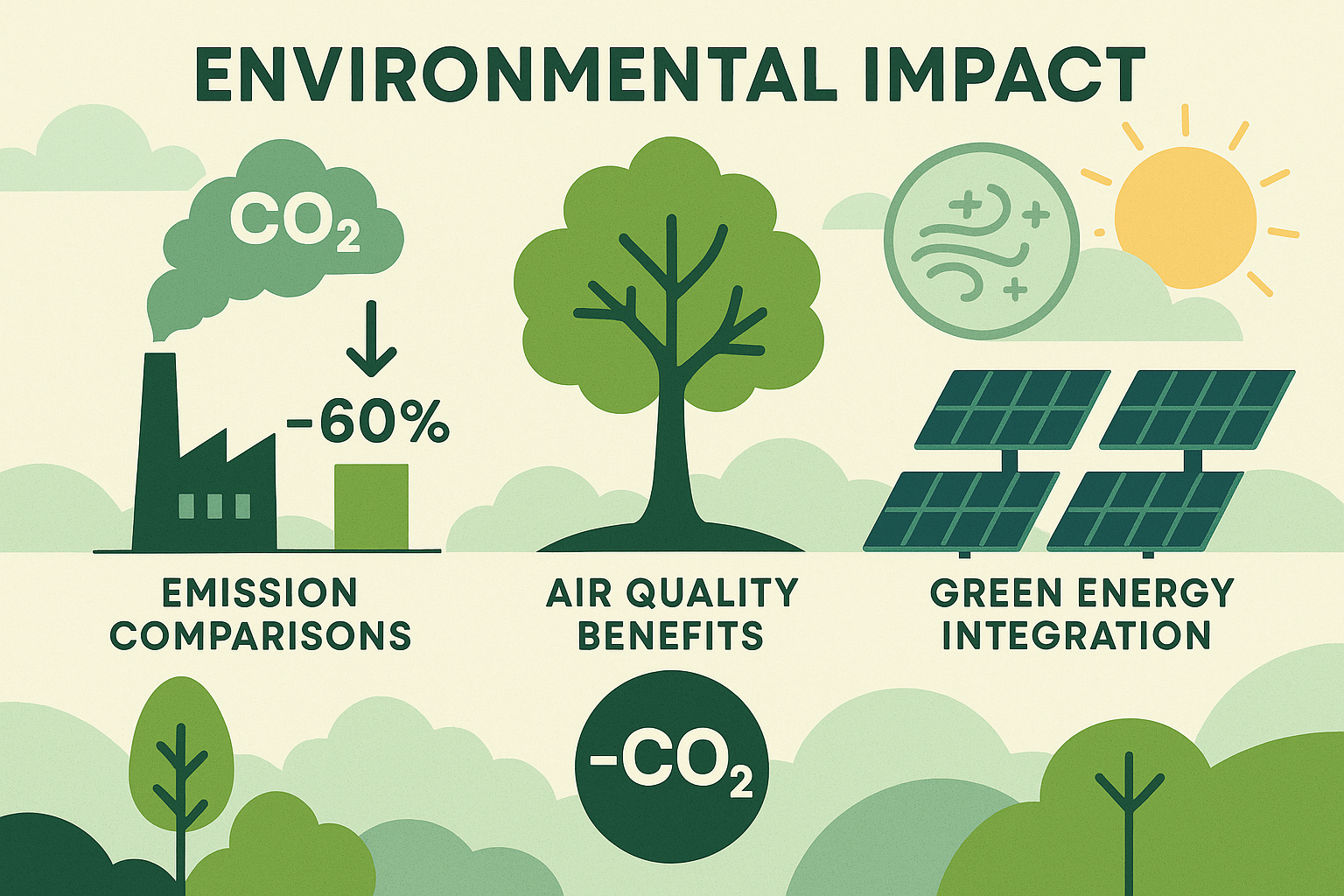
- Multiple driving modes
Crucial Things While Buying a Electric Car
If you’re planning on buying a electric car, here are the crucial factors to evaluate:
Pre-Purchase Checklist
1. Range Assessment:
- Calculate your daily driving distance
- Identify charging points on regular routes
- Consider seasonal range variations (10-15% reduction in winter)
2. Charging Infrastructure:
- Home charging setup feasibility
- Workplace charging availability
- Public charging network in your area
3. Financial Planning:
- Total cost of ownership calculation
- Available subsidies and incentives
- Financing options and interest rates
4. Service Network:
- Authorized service centers nearby
- Spare parts availability
- Technician training and expertise
Red Flags to Avoid
Unrealistic Range Claims: Be wary of manufacturers claiming unrealistic ranges. ARAI-certified ranges are more reliable than manufacturer claims.
Hidden Costs:
- Charging equipment installation
- Home electrical upgrades
- Annual maintenance contracts
Limited Service Network: Avoid brands with limited service presence in your region.
Interactive Electric Car Comparison Tool
🚗 Electric Car Comparison Tool
Compare electric cars under 5 lakhs and calculate your savings
Future Trends and Upcoming Electric Cars Under 5 Lakhs
The latest electric cars segment is evolving rapidly, with several exciting developments expected in 2025 and beyond.
Upcoming Launches in 2025
Maruti Suzuki’s First Electric Car:
- Expected launch: Q3 2025
- Estimated price: Rs 4.5-6 lakh
- Range: 250+ km
- Built on dedicated EV platform
Hyundai Casper EV:
- Expected launch: Q4 2025
- Estimated price: Rs 5.5-7 lakh
- Range: 300+ km
- Advanced ADAS features
Renault Kwid EV:
- Expected launch: Q2 2025
- Estimated price: Rs 5-6.5 lakh
- Range: 200+ km
- Proven platform reliability
Technology Improvements Expected
Battery Technology:
- 25% improvement in energy density
- 30% reduction in charging time
- 20% increase in battery life
- Improved cold weather performance
Manufacturing Scale:
- Local battery production
- Reduced import dependency
- Lower manufacturing costs
- Improved quality control
Financing Options for Electric Cars Under 5 Lakhs
Understanding financing options is crucial when buying a electric car, as several specialized schemes are available for EV purchases.
Bank Financing Options
SBI EV Loan:
- Interest rate: 8.5-9.5% per annum
- Loan tenure: Up to 8 years
- Processing fee: 0.35% of loan amount
- Special benefits: 0.25% rate reduction for women borrowers
HDFC Bank Green Car Loan:
- Interest rate: 8.75-9.75% per annum
- Loan tenure: Up to 7 years
- Processing fee: Rs 2,500 + GST
- Special benefits: Pre-approved loans for salaried individuals
Manufacturer Financing
Tata Motors Finance:
- Interest rate: 8.99% onwards
- Down payment: 15% onwards
- Tenure: Up to 7 years
- Special schemes: Festive season offers
MG Finance:
- Interest rate: 9.25% onwards
- Down payment: 20% onwards
- Tenure: Up to 6 years
- Special benefits: Buy-back guarantee
Leasing and Subscription Models
Several companies now offer innovative ownership models:
Zoomcar Subscribe:
- Monthly payment: Rs 15,000-25,000
- Includes insurance and maintenance
- Flexible tenure: 12-48 months
- No down payment required
Orix Auto Lease:
- Flexible lease terms
- Maintenance included
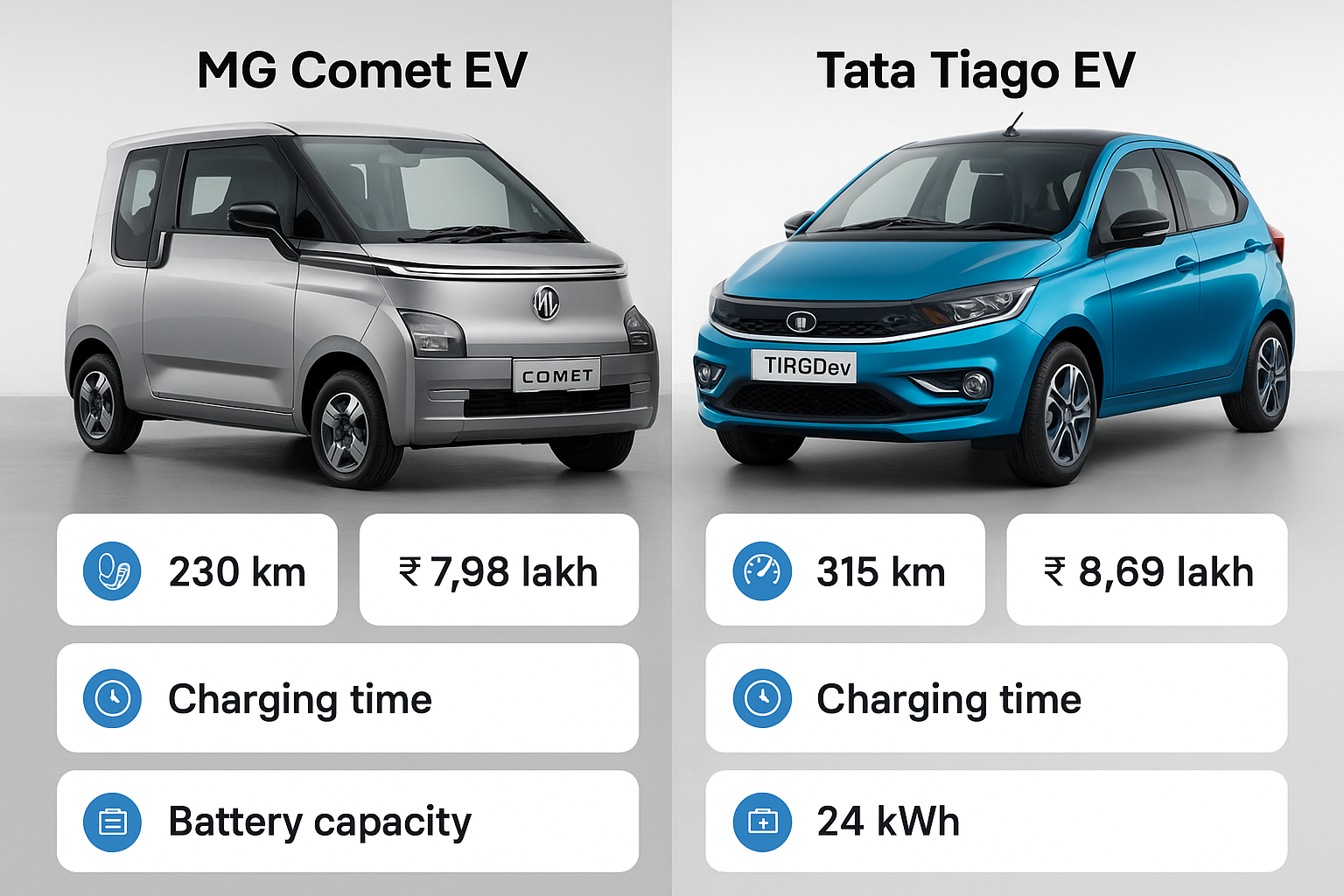
- End-of-lease options
- Corporate and individual plans
Environmental Impact and Social Benefits
Choosing electric cars under 5 lakh contributes significantly to environmental protection and social welfare.
Environmental Benefits
Emission Reduction:
- Zero tailpipe emissions
- 60-70% reduction in total lifecycle emissions
- Improved urban air quality
- Reduced noise pollution
Energy Efficiency:
- 90% energy conversion efficiency (vs 30% for ICE)
- Reduced dependence on imported oil
- Support for renewable energy integration
- Lower carbon footprint
Social and Economic Benefits
Job Creation:
- EV manufacturing jobs
- Charging infrastructure development
- Battery recycling industry
- Technical skill development
Energy Security:
- Reduced oil imports (currently $100+ billion annually)
- Domestic electricity generation
- Grid stability through V2G technology
- Rural electrification support
Tips for First-Time Electric Car Buyers
If you’re planning on buying a electric car for the first time, these practical tips will help ensure a smooth transition.
Pre-Purchase Preparation
1. Assess Your Driving Patterns:
- Track your daily commute distance for a week
- Identify longest regular trips
- Note parking availability at home/office
- Consider seasonal driving variations
2. Home Charging Setup:
- Electrical capacity assessment
- Dedicated parking availability
- Installation cost estimation
- Safety considerations
3. Financial Planning:
- Calculate total cost of ownership
- Explore all available subsidies
- Compare financing options
- Factor in electricity cost increases
Post-Purchase Best Practices
Charging Habits:
- Charge between 20-80% for battery longevity
- Use AC charging for daily needs
- Reserve DC fast charging for long trips
- Monitor charging costs and patterns
Maintenance Schedule:
- Follow manufacturer’s service schedule
- Regular tire pressure checks
- Battery health monitoring
- Software update installations
Common Myths About Electric Cars Debunked
Let me address some common misconceptions about electric cars under 5 lakh that might be holding you back from making the switch.
Myth 1: “Electric Cars Are Too Expensive”
Reality: While the upfront cost is higher, the total cost of ownership is significantly lower. With subsidies, many electric cars become price-competitive with diesel variants.
Myth 2: “Charging Takes Too Long”
Reality: Home charging happens overnight while you sleep. DC fast charging can add 200+ km range in 30-45 minutes, sufficient for most long-distance needs.
Myth 3: “Electric Cars Have Poor Performance”
Reality: Electric motors provide instant torque, resulting in better acceleration than most ICE cars. The electric motor delivers smooth, responsive performance.
Myth 4: “Battery Replacement Is Very Expensive”
Reality: Battery costs have decreased by 60% in five years. Most batteries last 8-10 years, and replacement costs continue to decline.
Myth 5: “Limited Model Options”
Reality: The market now offers diverse options, from compact city cars to SUVs. The extensive list of available models continues to grow rapidly.
Regional Considerations for Electric Car Adoption
Different regions in India present unique opportunities and challenges for electric vehicle adoption.
Metro Cities (Delhi, Mumbai, Bangalore, Chennai)
Advantages:
- Extensive charging infrastructure
- Maximum government incentives
- Better service network
- Higher environmental awareness
Considerations:
- Higher electricity costs in some cities
- Parking challenges
- Traffic congestion benefits (silent operation)
Tier-2 Cities (Pune, Jaipur, Indore, Kochi)
Advantages:
- Growing charging network
- State-specific incentives
- Lower traffic density
- Adequate service coverage
Considerations:
- Limited fast charging options
- Longer service intervals
- Range planning for intercity travel
Tier-3 Cities and Rural Areas
Advantages:
- Lower electricity costs
- Dedicated parking availability
- Government rural electrification support
- Emerging market opportunities
Considerations:
- Limited charging infrastructure
- Service network gaps
- Range anxiety for longer trips
- Technical support availability
Making the Final Decision: Electric vs Diesel
After considering all factors, here’s a framework to help you decide between electric cars and traditional diesel vehicles.
Choose Electric If:
✅ Daily driving is under 200 km ✅ You have dedicated parking with charging access ✅ Environmental impact is important to you ✅ You want lower operating costs ✅ You appreciate latest technology features ✅ Government incentives are available in your state
Consider Diesel If:
⚠️ You frequently drive 300+ km without breaks ⚠️ Charging infrastructure is limited in your area ⚠️ You need immediate refueling capability ⚠️ Budget is extremely tight (under Rs 4 lakh) ⚠️ You live in a remote area with limited service support
Hybrid Approach
Consider a gradual transition:
- Start with a used electric car to gain experience
- Install home charging infrastructure
- Upgrade to a new electric car after 2-3 years
- Keep a conventional car for long-distance travel initially
Conclusion
The landscape of electric cars in India under 5 lakhs has transformed dramatically, offering compelling alternatives to diesel vehicles. With models like the MG Comet EV starting at Rs 6.99 lakh and the Tata Tiago EV at Rs 7.99 lakh, electric mobility is no longer a distant dream but an accessible reality.
The financial benefits are undeniable – with potential savings of Rs 3-4 lakh over five years, electric cars offer superior value proposition compared to diesel alternatives. Government subsidies make these vehicles even more affordable, with effective prices dropping below Rs 6 lakh in many states.
The charging infrastructure has improved significantly, with over 12,000 public charging stations operational across India. Home charging solutions provide convenient overnight charging for daily commutes, while DC fast charging networks handle longer journeys.
User reviews consistently highlight the smooth driving experience, lower operating costs, and environmental benefits of electric cars. While range anxiety was a concern for early adopters, most current owners report that daily range requirements are easily met by modern electric cars.
Looking ahead to India 2025, the electric car market will offer even more choices, with several manufacturers launching affordable models. Battery technology improvements and manufacturing scale will further reduce costs while improving performance.
Your Next Steps:
- Test drive available electric cars in your city
- Calculate your specific savings using your driving patterns
- Research available subsidies in your state
- Assess home charging feasibility
- Compare financing options from multiple sources
- Book your electric car and join the sustainable mobility revolution
The transition from diesel to electric is not just about changing your car – it’s about embracing a cleaner, more economical, and technologically advanced future. With electric cars under 5 lakhs now offering practical solutions for Indian families, there has never been a better time to make the switch.
Whether you choose the compact efficiency of the MG Comet EV or the proven reliability of the Tata Tiago EV, you’ll be investing in a technology that saves money, protects the environment, and provides a superior driving experience. The future of Indian mobility is electric, and it’s more affordable than ever before.
